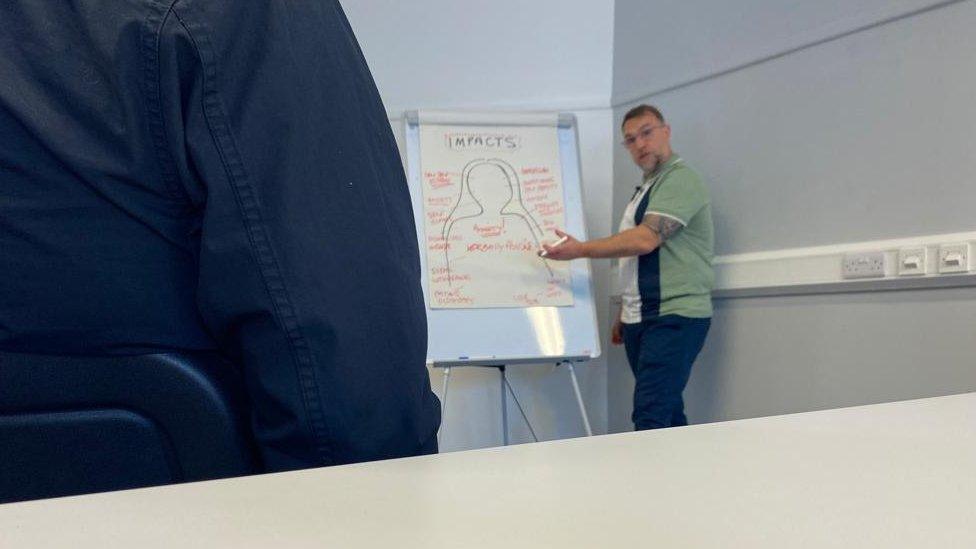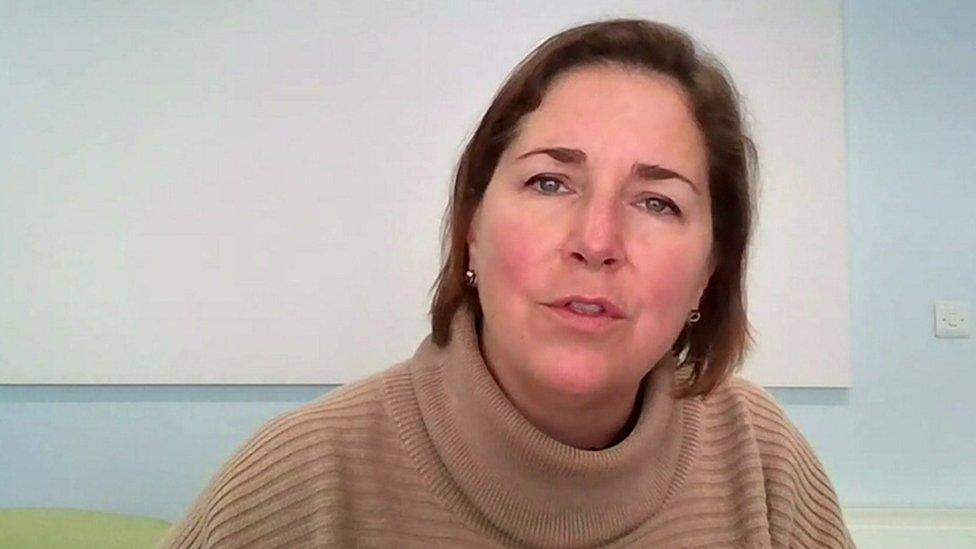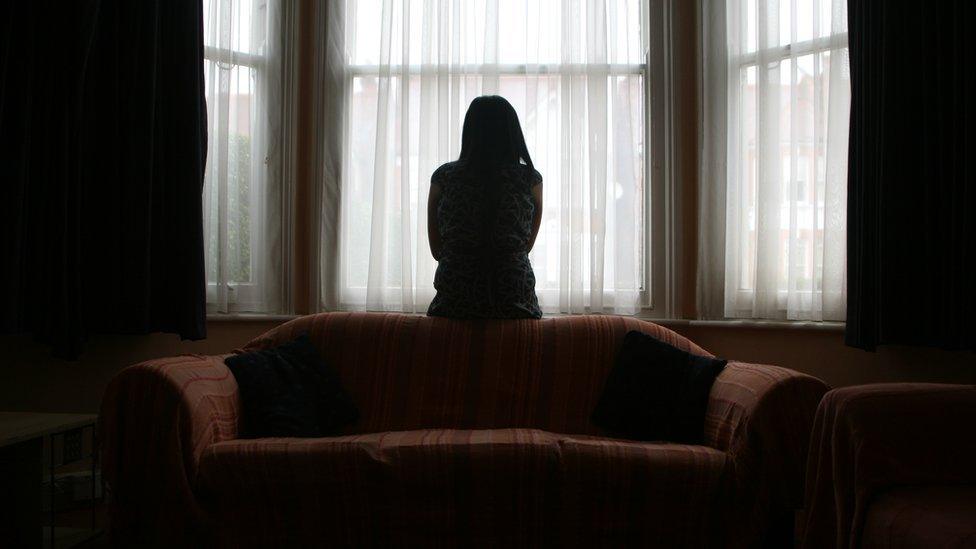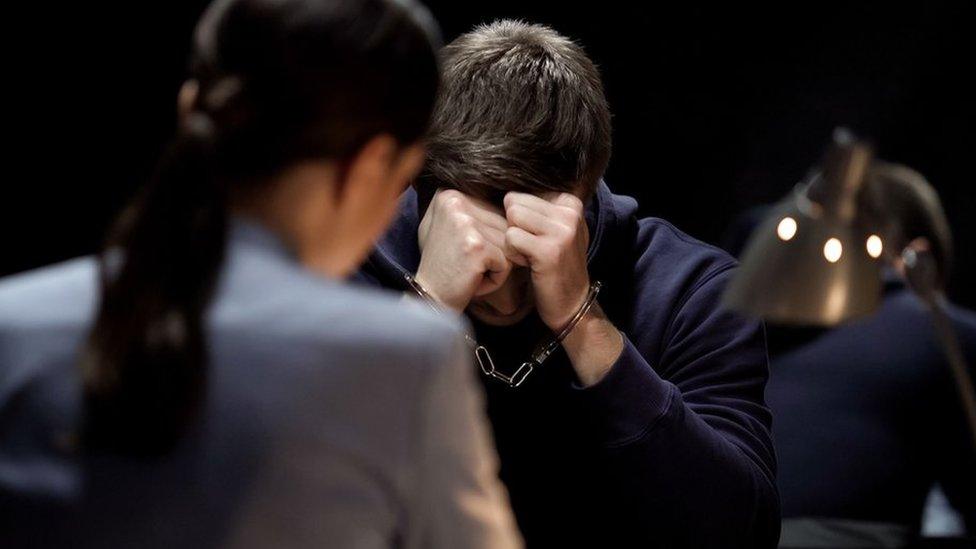Domestic abuse prevention schemes face 'dangerous' cuts - charities
- Published

About 1.7 million women suffer domestic abuse in the UK each year, according to official figures
Charities working to change the violent behaviour of domestic abusers have told the BBC that survivors' lives are being put at risk because of funding shortages. The Domestic Abuse Commissioner has said cuts have hit an already limited provision and has called for more funding for perpetrator programmes to help stop the cycle of abuse and improve the lives of families.

In a former railway warehouse in West Yorkshire, men gather every week to talk about how they have abused their partners.
They meet at Yorkshire Children's Centre (YCC) in groups of up to 12 for two-hour sessions designed to help them better understand their behaviour and take responsibility for it.
Some of them have been convicted of violently attacking women, while others have spent years manipulating and controlling their wives or girlfriends. However, all have one thing in common: they are there because they want to change.
The Huddersfield-based charity has been running this domestic violence prevention programme since 2012 and staff said such work was crucial in "breaking the cycle" of abuse suffered by millions of people across the UK.
But they said the scheme was now under threat due to funding cuts which had already forced YCC to scale back its work with perpetrators and turn away men who wanted help to change their ways.

Jonathan Fell, pictured right, runs sessions in West Yorkshire aimed at helping domestic abusers change their behaviour
Jonathan Fell, the charity's domestic abuse service manager, said this was "dangerous" and "really frustrating".
"You've got guys out there who want to be worked with. They realise they need to take this programme, but you're having to say no," he told the BBC.
Men who are accepted onto the scheme attend up to 20 sessions aimed at providing them with greater awareness of their abusive behaviour, strategies for dealing with conflict and the ability to communicate more positively.
The programme also offers support for three months after the sessions have finished - as well as to family members who are deemed to be at risk.
The Domestic Abuse Commissioner for England and Wales has said there are already too few schemes like this.
A report published in 2022 warned of "deeply concerning" gaps in provision, with only 7% of survivors who wanted their abuser to receive support to change their behaviour able to access it.
'Change for the better'
One man who completed YCC's course this year told the BBC that the sessions were "intense" and "hard-hitting".
He added: "I think they have to be. You have to pull it back and make it raw to understand the impact you have on another individual.
"It's taught me a lot about how I behaved and why, in terms of the beliefs I may have formed as I was growing up.
"I think it's given me the tools to manage my behaviour and know what's right."
The man, who spoke on the condition of anonymity, self-referred to the scheme after a flashpoint in his relationship which he said made him realise "enough is enough".
"You have to look at the bigger picture," he added.
"This is your relationship, this is your partner, this is someone you love. You want change for the better, and for them."
'Massive importance'
YCC said it had received 316 referrals to its domestic abuse prevention scheme since April 2021, adding that demand for the sessions was growing. Funding, however, is not.
Last year, the charity received £100,000 from the Home Office and £90,000 from Kirklees Council to run the sessions. Both contracts came to an end this year and YCC's bid for a share of a £36m government domestic abuse intervention fund was rejected.
The charity said it was now spending its reserves to keep the scheme going until April 2024, but it was likely to have to stop offering the sessions next year if it did not secure other funding.
"It's of massive importance," said Mr Fell. "Wherever there's a perpetrator, there's a victim.
"Unless there's work ongoing with perpetrators, the cycle is never going to change."

If you are affected by any of the issues in this article you can find details of organisations that can help via the BBC Action Line.

Other charities which work with perpetrators also told the BBC they had lost funding as local authorities across the UK cut spending.
Foundation, which runs a domestic abuse prevention programme in North Yorkshire, said its work would be "reduced significantly" next year.
Sinead Cregan, the charity's director of development and innovation, said that "inevitably means there could be more incidents of domestic abuse taking place".
"The best way in which to tackle abuse is to work with the perpetrators, then hopefully you're preventing further incidents," she added.
Foundation, whose work is funded by City of York Council, North Yorkshire Council and the region's Police, Fire and Crime Commissioner, said it received 157 referrals to its scheme last year, a figure up 30% on 2021-22.
Ms Cregan said the charity was waiting to hear if it had secured a new, reduced contract to continue the work. However, she said that even if it was successful, it would have to halve the number of people it accepted onto its prevention scheme.
"The problem we've got is that local authority budgets are being decimated, so they're having to make choices about who they can support and who they can't," she added.
'Huge gaps'
An estimated 2.4 million adults, 1.7 million of them women, suffered domestic abuse in the year to March 2022, according to the Office for National Statistics.
Respect, a charity which oversees work with domestic abuse perpetrators, said it had received 8,713 calls and emails to its national helpline in 2022-23 - up 41% on the year before the start of the Covid pandemic, when figures peaked during lockdown.
Nicole Jacobs, the Domestic Abuse Commissioner, said she was particularly worried about a shortage of provision for men who had not been convicted of criminal offences and were voluntarily seeking help.
She told the BBC: "By far, there are not enough of these programmes.
"If someone is convicted of a crime, maybe they'll be offered through probation or sentence a perpetrator programme, but it's the community-based services or provision I'm most concerned about because that is the most patchy in England and Wales."
Ms Jacobs called for a significant injection of funding across England and Wales to fill what she described as "huge gaps" in provision.

The Domestic Abuse Commissioner for England and Wales said there were too few schemes targeted at preventing abuse
Kirklees Council said it "remained committed to reducing violence against women and girls" but had previously commissioned Yorkshire Children's Centre's work with funding from the Home Office.
A council spokesperson said: "As the funding has now come to an end, we are unable to continue providing financial support.
"We are working closely with local community groups and organisations to make them aware of any future funding opportunities, how we can collaborate on opportunities, and the relevant procurement process to apply for them."
A Home Office spokesperson said: "We have worked to increase the availability of domestic abuse perpetrator interventions.
"We are supporting 50 of these initiatives across England and Wales over the next two years, backed by up to £39m of funding."

Follow BBC Yorkshire on Facebook, external, X (formerly Twitter), external and Instagram, external. Send your story ideas to yorkslincs.news@bbc.co.uk, external.
Related topics
- Published10 June 2021

- Published21 January 2020
